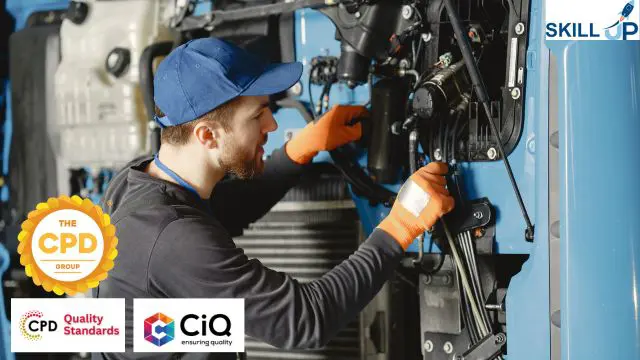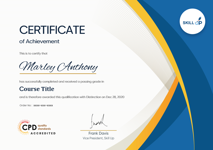
Applications of Work, Force and Energy Principles in Mechanical Engineering
CPD Accredited | FREE PDF Certificate & Transcript | Lifetime Access| Tutor Support | Free Exam
Skill Up
Summary
- Certificate of completion - Digital certificate - Free
- Certificate of completion - Hard copy certificate - £9.99
- Exam(s) / assessment(s) is included in price
- Tutor is available to students
Add to basket or enquire
Overview
✿ Applications of Work, Force and Energy Principles in Mechanical Engineering ✿
Unlock the potential of Mechanical Engineering through the dynamic applications of Work, Force, and Energy principles. In the world of Mechanical Engineering, these foundational principles serve as the driving force behind innovation, efficiency, and cutting-edge technology.
Mechanical Engineering, with its emphasis on Work, Force, and Energy, plays a pivotal role in designing and optimizing machinery, ensuring peak performance and durability. Engineers harness these principles to create groundbreaking solutions for a wide array of industries, from automotive and aerospace to renewable energy and manufacturing.
By integrating Work, Force, and Energy principles, Mechanical Engineering not only enhances the functionality of machines but also contributes to sustainable practices. The optimization of energy utilization, the calculation of precise forces, and the efficient management of work processes are essential aspects that underscore the significance of these principles in shaping the future of mechanical engineering.
In a world driven by innovation and technological advancement, the applications of Work, Force, and Energy principles in Mechanical Engineering stand as a testament to the discipline's transformative power. Elevate your projects, enhance your designs, and revolutionize your approach with Mechanical Engineering – where Work, Force, and Energy converge for unparalleled results.
Join our Mechanical Engineering Diploma program and unlock the door to a promising future, where innovation meets excellence in Mechanical Engineering.
Learning Outcomes:
- Gain a strong foundation in engineering mechanics and heat and thermodynamics.
- Understand the principles of work, force, and energy and their applications in Mechanical Engineering.
- Acquire knowledge of fluid mechanics, structural mechanics, and machine dynamics.
- Develop skills in mechanical design and the use of hydraulic machines.
- Learn about strain hardening processes, solidification applications, and welding techniques in Mechanical Engineering.
- Master engineering drawing and its role in Mechanical Engineering.
CPD
Course media
Description
This comprehensive course on Applications of Work, Force and Energy Principles in Mechanical Engineering takes you on a deep dive into the foundational concepts of engineering mechanics, heat and thermodynamics, and the crucial principles of work, force, and energy. The course explores various aspects of fluid and structural mechanics, as well as machine dynamics, providing a holistic understanding of Mechanical Engineering.
The course also delves into the practical aspects of Mechanical Engineering, including mechanical design, hydraulic machines, strain hardening processes, solidification applications, and welding techniques. The curriculum culminates with a focus on engineering drawing, equipping you with the necessary skills to excel in the diverse field of Mechanical Engineering.
Here is the course curriculum for the primary Title Course :
Mechanical Engineering
- Module 01: Introduction
- Module 02: Engineering Mechanics - I
- Module 03: Engineering Mechanics - II
- Module 04: Heat and Thermodynamics
- Module 05: Work, Force and Energy
- Module 06: Fluid Mechanics
- Module 07: Structural Mechanics
- Module 08: Machines - I
- Module 09: Machines - II
- Module 10: Machine Dynamics
- Module 11: Mechanical Design
- Module 12: Hydraulic Machines
- Module 13: Strain Hardening Processes
- Module 14: Application of Solidification
- Module 15: Welding
- Module 16: Engineering Drawing
_____________________________________________________________________________________________
Our Learner's Top Reviews:
- Varsha Sivamohan - “It was a great experience. The course was jampacked with excellent information. And when I needed help, Skill-up helped me with technical problems instantly. Fast feedback.”
- Charlie Anderson- “The support team was FANTASTIC!!! Very quick to respond and even though I was nervous as I am not good at tests, they made me feel comfortable. I am very grateful for the support”
- Aarini Sinha - “Amazing workshop. Very informative for the freshers like me. Learned a lot of things about digital marketing. I'm really thankful”.
Over 100+ glowing reviews.
_____________________________________________________________________________________________
Assessment
After completing all the modules of the Mechanical Engineering, your learning will be assessed by an assignment or multiple-choice based exam. You may choose to participate in a Mock Exam before attending the Mechanical Engineering course completion Final Exam with no extra cost.
Who is this course for?
- Aspiring mechanical engineers seeking to enhance their understanding of work, force, and energy principles.
- Engineering students looking to gain a comprehensive understanding of Mechanical Engineering.
- Professionals in the engineering field seeking to broaden their knowledge and skills.
- Individuals interested in learning about the principles and applications of Mechanical Engineering.
Requirements
Since no prior knowledge or experience is required.
Take your time to finish this Mechanical Engineering course, and there is no deadline for the course.
Career path
- Mechanical Engineer: £30,000 - £50,000 per annum
- Design Engineer: £25,000 - £45,000 per annum
- Structural Engineer: £30,000 - £55,000 per annum
- Fluid Mechanics Engineer: £30,000 - £55,000 per annum
- Machine Dynamics Specialist: £35,000 - £60,000 per annum
- Engineering Project Manager: £40,000 - £70,000 per annum
Questions and answers
Currently there are no Q&As for this course. Be the first to ask a question.
Certificates
Certificate of completion - Digital certificate
Digital certificate - Included
Certificate of completion - Hard copy certificate
Hard copy certificate - £9.99
Inside the UK student have to pay an additional delivery fee of £10, whereas International students are required to pay an additional fee of £19.99 to receive a hard copy of the certificate delivered to their address.
Reviews
Currently there are no reviews for this course. Be the first to leave a review.
Legal information
This course is advertised on reed.co.uk by the Course Provider, whose terms and conditions apply. Purchases are made directly from the Course Provider, and as such, content and materials are supplied by the Course Provider directly. Reed is acting as agent and not reseller in relation to this course. Reed's only responsibility is to facilitate your payment for the course. It is your responsibility to review and agree to the Course Provider's terms and conditions and satisfy yourself as to the suitability of the course you intend to purchase. Reed will not have any responsibility for the content of the course and/or associated materials.




